Live on the homepage now!
Reader Supported News
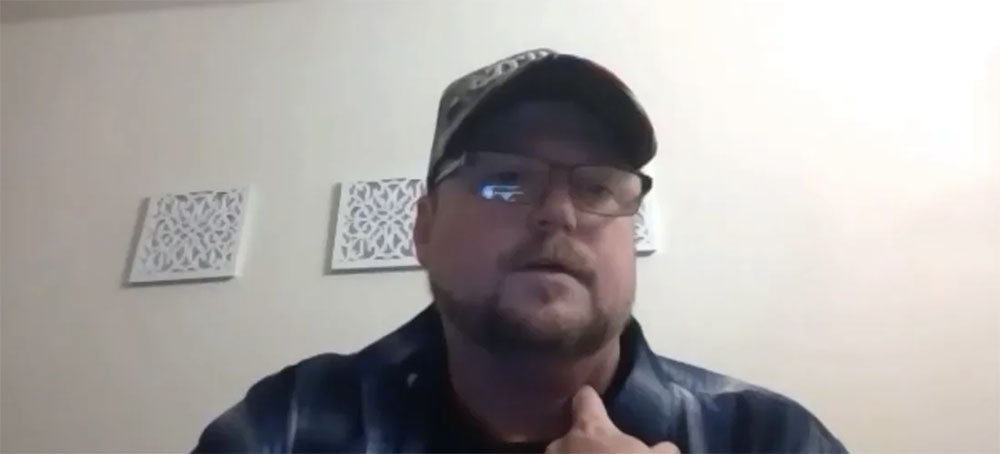 At Reffitt's trial, prosecutors presented images of the defendant that were from what they referred to as a "mountain of evidence," including a recorded Zoom meeting between Reffitt and members of his militia, as shown here. (photo: Department of Justice)
At Reffitt's trial, prosecutors presented images of the defendant that were from what they referred to as a "mountain of evidence," including a recorded Zoom meeting between Reffitt and members of his militia, as shown here. (photo: Department of Justice)
The Three Percenters recruiter, the first Jan. 6 defendant convicted at trial, was found guilty of leading a charge while armed that led to first break-in at the U.S. Capitol and also of threatening his son
The request for Guy Reffitt, a recruiter for the extremist Three Percenters movement who led a mob at the Capitol, is roughly one-third longer than the nine to 11 years recommended under advisory federal guidelines. Prosecutors say the stiff punishment is warranted, following up for the first time on threats to request an enhanced terrorism sentencing penalty for defendants who reject plea deals.
Reffitt was convicted March 8 of five felony offenses, including obstruction of Congress as it met to certify the 2020 election result, interfering with police and carrying a firearm to a riot, and threatening his teenage son, who turned him in to the FBI.
The defense for Reffitt, a 49-year-old former oil industry rig manager, asked for a below-guidelines sentence of two years in prison. Attorney F. Clinton Broden said in a filing that his client committed no violence and has no criminal history, yet prosecutors are seeking far more time for him than for defendants who have pleaded guilty to assaulting police.
“It makes a mockery of the criminal justice system, the Sixth Amendment right to trial, and the victims assaulted by [others] to argue that Mr. Reffitt should be given a sentence greater than (let alone three times greater than) a defendant who assaulted police officers on at least two separate occasions, spent three hours on the Capitol grounds and who has a past history of violence,” Broden wrote.
But Assistant U.S. Attorneys Jeffrey Nestler and Risa Berkower said Reffitt’s case is exceptional, calling him “in a class all by himself” among those sentenced so far.
Reffitt “played a central role” at the head of a vigilante mob that challenged and overran police at a key choke point, a stairway leading up from the Lower West Terrace, before the initial breach of windows near the Capitol’s Senate Wing Doors at 2:13 p.m., prosecutors said. After the riot, Reffitt warned his son and 16-year-old daughter that “if you turn me in, you’re a traitor, and traitors get shot,” his son testified at the trial.
Conventional sentencing rules are of “inadequate scope” to account for the range of Reffitt’s obstruction, witness tampering and weapon offenses, prosecutors wrote in a 58-page sentencing memo.
“Reffitt sought not just to stop Congress, but also to physically attack, remove, and replace the legislators who were serving in Congress,” prosecutors wrote.
They called his conduct “a quintessential example of an intent to both influence and retaliate against government conduct through intimidation or coercion” and said it reflected the statutory definition of terrorist violence that is subject to harsher punishment.
“We do believe what he was doing that day was terrorism. We do believe he is a domestic terrorist,” Nestler told the judge.
Reffitt recorded himself at a rally led by President Donald Trump at the Ellipse saying he was ready to drag lawmakers including House Speaker Nancy A. Pelosi (D-Calif.), and then Senate Minority Leader Mitch McConnell (R-Ky.) “out kicking and screaming,” with “her [Pelosi’s] head hitting every step on the way down.”
A jury found that Reffitt traveled to D.C. from his home in Wylie, Tex., with an AR-style rifle and semiautomatic .40-caliber handgun and repeatedly stated his intention to come armed with a handgun and plastic handcuffs to drag lawmakers out of the building. After returning home from Washington, he threatened his children to ensure they did not to turn him in to authorities.
The request by the U.S. attorney’s office in D.C., which is overseeing prosecutions of roughly 840 Capitol siege defendants federally charged so far, is not binding on U.S. District Judge Dabney L. Friedrich, who has gone below prosecutors’ recommendation in 22 of 24 Jan. 6 sentencings to date.
The longest sentence in a Jan. 6 case so far is 63 months, given to a Florida man who pleaded guilty to attacking police with a fire extinguisher and wooden plank and a D.C. man who assaulted three officers and shattered a riot shield with a pole.
By comparison, Friedrich has sentenced only three defendants who have pleaded guilty to felonies so far, the longest to 27 months in prison, also for attacking police.
Before delivering her sentence, Friedrich refused to apply a discretionary enhanced terrorism sentencing penalty as the government requested, saying that while Reffitt took on a “self-appointed leadership role” in the riot and made “extremely disturbing” remarks about overthrowing the government, prosecutors have not asked judges to impose such a penalty against several other defendants who made similar “disturbing comment, ” including those who, unlike Reffitt, assaulted police, breached the Capitol building or had prior criminal histories.
Friedrich said her decision was “a real effort on the court’s part to ensure there are not sentencing disparities between riot defendants.”
Still prosecutors hoped her final judgment would send a clear signal to the roughly 330 defendants still awaiting trial on felony charges and who may still be considering whether to accept a plea deal or gamble before a jury. About 70 people have pleaded guilty, and nine, including Reffitt, have been convicted at trial.
Reffitt left home at 15, moved in with his older sister and began working as a KFC dishwasher after enduring years of physical abuse from his father, Broden wrote in his client’s defense. After becoming a father himself, Broden said, Reffitt was devoted to his children and to creating safe spaces for others.
Reffitt, his attorney said, was a self-made man who took his family abroad while he worked in places including Malaysia in charge of operations worth tens of millions of dollars, but was financially and emotionally devastated after a downturn in the oil and gas industry. He lost his job in November 2019, only a few months before the pandemic swept the United States.
Reffitt’s daughters noticed that “his mental health was declining” over that period, Broden wrote. Reffitt fell “down the rabbit hole of political news and online banter,” wrote one of his daughters, and he fell under the sway of Donald Trump “constantly feeding polarizing racial thought.”
“I could really see how my father[’]s ego and personality fell to his knees when President Trump spoke, you could tell he listened to Trump’s words as if he was really truly speaking to him,” one of Reffitt’s daughters wrote the judge in seeking leniency.
“My father’s name wasn’t on the flags that everyone was carrying there that day … There was another man’s name,” Peyton Reffitt added in person in court Monday, referring to Trump. Speaking of her father, she said, “He was not the leader.”
Letters from nine friends and relatives provided to the court by Reffitt’s defense “describe a depressed man who believed he was unable to adequately provide for his family (his life’s mission), and a man who felt cast aside and marginalized,” Broden wrote.
Reffitt started a security business and joined the Three Percenters in Texas. The right-wing anti-government group is named after the myth that only 3 percent of colonists fought in the American Revolution against the British.
In a letter to the judge, Reffitt outlined a string of family traumas since 2020 including medical and mental health emergencies and pleaded for leniency for the sake of his family.
“My regrets for what has happened is insurmountable. There’s not a day go by that I don’t regret how much this has affected [my wife and children],” Reffitt wrote. “Yes, what is happening to my family is all my fault, I would like to fix it, please. … I simply ask for a chance to prove myself again.”
In a letter to the court read by prosecutors, Reffitt’s son Jackson Reffitt, said he supported prosecutors’ sentencing recommendation, so long as his father could benefit from rehabilitation and counseling in prison.
One of the Capitol Police officers who confronted the defendant, Shauni Kerkhof, said Reffitt “intended to harm members of Congress and to stop the certification of the electoral mob” after pushing past officers who “swore an oath to protect the Congress and the American people.”
Kirkoff said Reffitt’s writings justifying his actions made her “sick.”
“His actions weren’t the actions of a patriot. They were actions of a domestic terrorist. He was intent on harming fellow Americans and our democratic processes himself. This was a man who threatened his own children if they turned him in,” Kerkhof told the court.
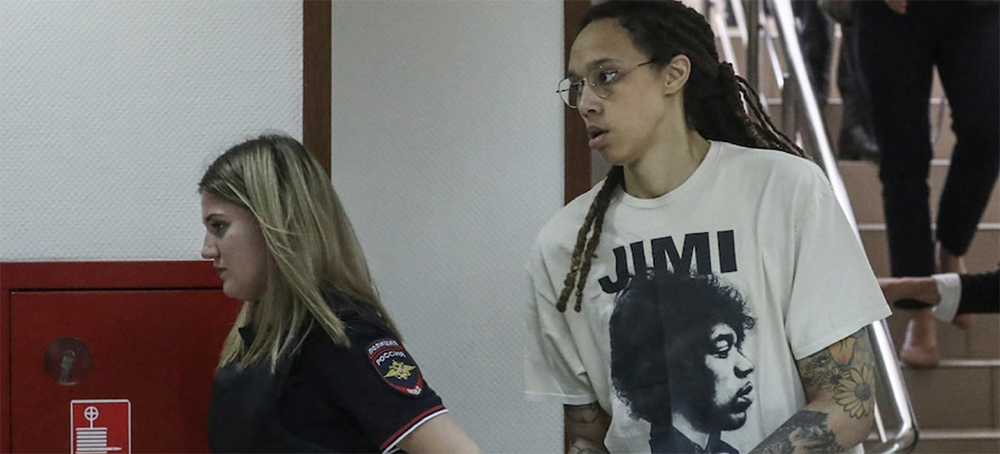 WNBA player Brittney Griner is escorted to a courtroom near Moscow as her trial begins on July 1. (photo: Maxim Shipenkov/EPA-EFE/Shutterstock)
WNBA player Brittney Griner is escorted to a courtroom near Moscow as her trial begins on July 1. (photo: Maxim Shipenkov/EPA-EFE/Shutterstock)
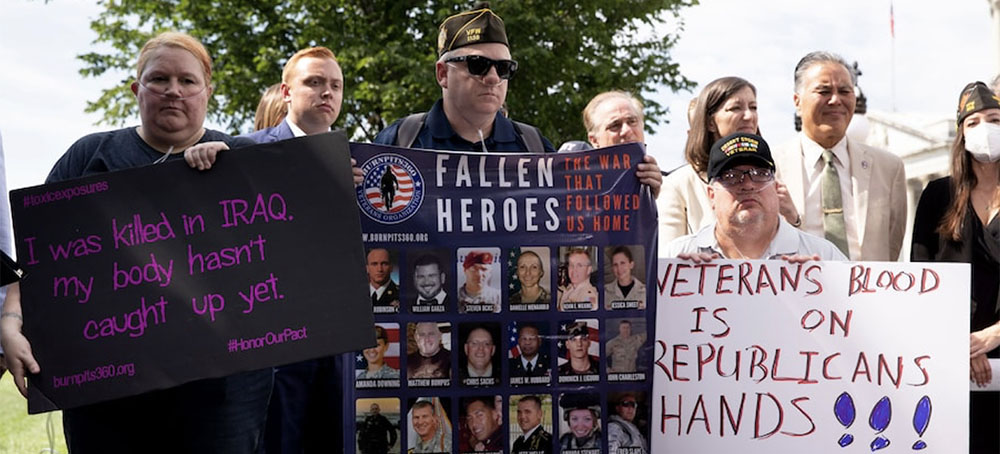 Veterans and supporters attend a news conference on toxic-exposure legislation in Washington on July 28. (photo: Michael Reynolds/EPA-EFE/Shutterstock)
Veterans and supporters attend a news conference on toxic-exposure legislation in Washington on July 28. (photo: Michael Reynolds/EPA-EFE/Shutterstock)
The former soldier recalls days when the smoke from the burn pits made it too hazardous for helicopters to fly overhead. While some of his infantrymen never made it out of the war zone, others who did later fell ill from the toxic fumes they inhaled daily, he said.
Powers now fears a similar fate: “It’s just a matter of time until it happens to me,” he told The Washington Post.
He was among the veterans, military family members and advocates staged on the Capitol steps for the fourth night on Sunday, pledging to remain until Congress passes a bill that covers health care for those exposed to toxins while serving in uniform. Earlier that day, the head of the Department of Veterans Affairs warned that a new Republican proposal could leave the agency “rationing” veterans’ health care. GOP lawmakers blocked the aid from passing last week in what comedian Jon Stewart, a longtime veterans advocate, blasted as “a disgrace.”
“We fought for this country freely, and we expect now that people will fight for us and fight for our basic health care,” said Samantha Turner, an Army veteran who served near burn pits in Kuwait. Turner, who has sleep apnea, now uses a machine to breathe at night.
“We’re not political pawns,” she added.
Though exposure to burn pits is known to cause cancers, sleep apnea and other respiratory, cardiovascular and neurological conditions, the Senate Veterans’ Affairs Committee’s top Republican said about 70 percent of all disability claims related to the toxins are denied because of service members’ inability to prove a link between their conditions and the hazardous substances. For years, activists had been fighting for an expansion in veterans’ health care coverage that would remove that burden-of-proof requirement — resulting in a bill known as the Pact Act.
The legislation was welcomed by veterans and their loved ones. And it was poised to pass after sailing through the Senate by an 84-to-14 vote in June.
But when the bill was sent back to the Senate for a second vote on Thursday after the House made adjustments, 25 Republicans reversed course. The bill fell short of the required 60 votes to overcome a filibuster, with a final 55-42 tally — a situation Turner called “a slap in the face.”
The reversal was widely decried by Democrats, veterans and advocates. Some accused the GOP of retaliating against the go-ahead Democrats received to pass climate change legislation without Republican votes.
But Sen. Patrick J. Toomey (R-Pa.), who voted against the bill twice and has proposed an amendment, said the reversals hinged on an accounting provision — saying that moving certain benefits spending from VA’s discretionary budget to its mandatory budget would “create room in future budgets for $400 billion of totally unrelated, extraneous spending on other matters,” he said during a Sunday interview with CNN.
Department of Veterans Affairs Secretary Denis McDonough argued that Toomey’s proposed amendment could create a scenario in which Congress changes or caps the amount the department spends on veterans’ health care annually. He also said funds would be terminated after a decade.
“I can’t, in good conscience, do that, because the outcome of that will be rationing of care for vets, which is something I just can’t sign on,” McDonough told CNN’s Jake Tapper on Sunday.
Toomey fired back, calling McDonough “either misinformed about my proposed amendment or willfully dishonest.”
“It would not reduce spending on veterans by one penny,” Toomey said. “It would not force care to be rationed. It would not end any veterans program.”
Another procedural vote on the bill is scheduled for Monday. Turner, who has been on the Capitol steps for three days, compared the situation to watching “political poker” while some veterans suffer.
Near her spot on the steps, a “missing man’s table” was illuminated by the moonlight. It was set with a plate, a candle and a vase tied with a red ribbon.
“It commemorates all those of us who didn’t make it,” Turner said, “whether that’s in combat or in its aftermath.”
With her outside the Capitol, she said, are some veterans who are battling terminal cancers. They’ve “chosen to literally spend their last days of life sitting here,” Turner said through tears.
Some had made long trips to plead for change. Dan Pierce, a 29-year-old military family member, traveled from South Carolina after witnessing his uncle “having to fight to get every single treatment he needed after serving.”
“I’ve lost too many people to this,” Pierce added. “We need to give veterans what they need and deserve. Their lives depend on it.”
Around him, a dozen people sat in a circle — some stationed there for hours. Local support had poured in, including cases of water bottles and food. Chef José Andrés had been sending warm meals twice a day. There was a FaceTime call with President Biden, whose son died after serving near burn pits. But the situation still felt “devastating,” said Matthew Schwartzman, the director of legislation and military policy for the Reserve Organization of America.
“What it really comes down to is, this bill should’ve been signed into law already,” he said. “No one should have to be here to see this bill through to the end.”
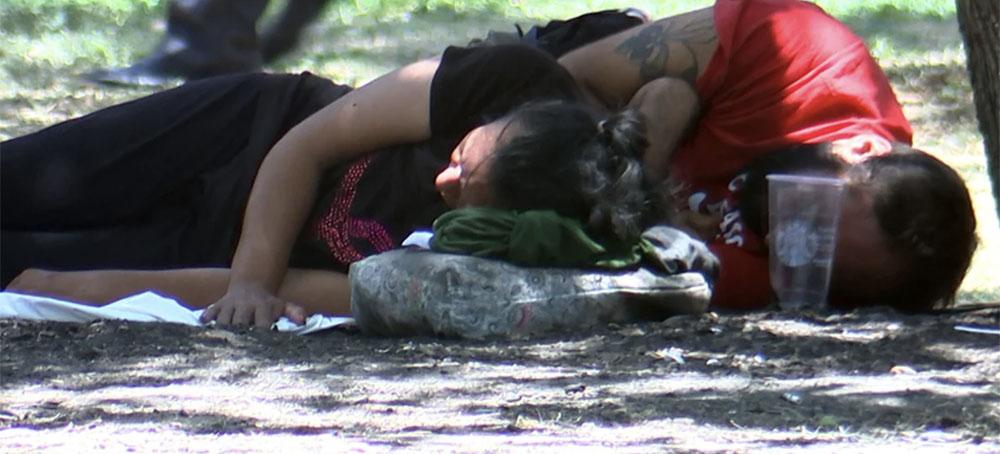 Migrants rest at a park during a hot day in July, in San Antonio. (photo: Austin Anderson)
Migrants rest at a park during a hot day in July, in San Antonio. (photo: Austin Anderson)
"With all sincerity, I said that I had no relatives here and that I had nowhere to go,” said Venezuelan asylum seeker Adri Fernández. He trusts his American dream, which is to "work and lift your back."
Unlike the families and unaccompanied children who have been the main groups migrating to the U.S. this past decade, Fernández is one of the single adults arriving without family to turn to or contacts willing to help him get on his feet after he was released by U.S. Immigration and Customs Enforcement.
Fernández, who currently awaits scheduled hearings regarding his request for asylum, ended up in San Antonio because that's where immigration officials decided he should go. A stranger drove him the nearly 200 miles from Laredo, Texas.
“When I arrived, they started asking me at Immigration where I am going. With all sincerity, I said I had no relatives here and that I had nowhere to go,” Fernández, 26, said. “So they gave me an address and told me: Does San Antonio work for you? I told him yes.”
San Antonio, as well as other cities, including Washington, D.C., and New York, are grappling with how to help the growing number of asylum seekers like Fernández.
“I don’t have a dollar to live on,” he said, as one of 15 migrants in similar circumstances who spoke to Noticias Telemundo Investiga.
But Fernández said he trusts “the American dream, which is to work and lift your back.”
Fernández’s first appointment with ICE is on Aug. 25 and his first hearing with the immigration judge will be on March 5, 2024, both in San Antonio. Failing to show up could lead to a decision to deport him without him having his day in court.
Home is where ICE sends you
Catholic Charities, part of the San Antonio archdiocese, estimates that about half the migrants it serves are single adults with no connections in the U.S. The organization said it has seen more of these arrivals in the past few years.
According to the American Immigration Council, single adults were responsible for more than half of all border apprehensions last year. That increase followed a lull in single adults crossing the border from Mexico at the time of the Great Recession, a trend that continued for about a decade, followed by a rise in migration of unaccompanied minors and families with children.
Asylum seekers who are awaiting their scheduled hearings generally arrive in cities like San Antonio with documents from ICE that say "currently residing at" and an address.
A check of the addresses by Noticias Telemundo Investiga found they generally belonged to nonprofit organizations or U.S. contacts provided by the migrants; some contacts didn't want to take responsibility for them or didn't answer when a reporter called the corresponding phone numbers.
An ICE spokesperson in San Antonio said the cities to which it sends migrants, and the specific addresses, were decided on a case-by-case basis.
“Individuals released from ICE custody make transportation arrangements and have a temporary support plan before their release,” the ICE spokesperson said in an email.
The spokesperson said ICE coordinates with local nonprofit organizations to give migrants “temporary shelter, food, water, clothing and transportation after their release" but didn't specify as to the situation in San Antonio.
Adri Fernández, the Venezuelan asylum seeker, said the address he was given was an office building that housed a nonprofit group, which told him it could provide him with neither shelter nor help at the time.
“They tell me — they don’t have any help for Venezuelans right now,” he said.
He found his way to a plaza in central San Antonio where others who have migrated congregate, and where a church offers them a place to sleep at night.
Catholic Charities said it has found several of its San Antonio addresses appearing on migrants’ documents, although neither the government nor asylum seekers have asked permission beforehand to use these addresses.
“We have heard of people showing up at our agencies without notifying them beforehand, but that varies by place. The Department of Homeland Security makes that decision, but we don’t know exactly where that’s happening," said Patricia Cole, Catholic Charities national spokesperson.
Catholic Charities in San Antonio directs the migrants to shelters, hotels or churches in the city. It helps buy migrants tickets, but demand is high and paying for them poses a challenge, the group said.
“We don’t leave anyone on the street. We send them wherever we can," said Antonio Fernández, president and CEO of Catholic Charities in San Antonio. But he added that the group, which receives federal grants and private donations, can't provide long-term shelter.
The organization will be in charge of a new shelter, and it expects to receive Federal Emergency Management Agency funds to run it, according to Fernández.
San Antonio receives about 600 migrants a day, and about 500 of them need accommodation for at least that first night, said Roland Martinez, public relations manager for the city of San Antonio. Since April 2021, some 185,000 migrants have passed through San Antonio. Most continue on to other parts of the country.
For weeks, migrants released by ICE at the border or in San Antonio have arrived at the airport or the Greyhound bus station downtown.
On July 7, San Antonio opened a temporary center to welcome those who have recently arrived for a few hours while they wait for their connections to other parts of the country.
The city characterizes it as “a safe and welcoming place for migrants traveling through San Antonio.”
After two weeks, according to Noticias Telemundo, the center had to close because it was at capacity, and city officials were requesting more help from the federal government.
At Christian Assistance Ministry in San Antonio, two brothers stood in a line of people who had recently migrated — along with city residents who were currently homeless — to get a breakfast to go, a shower and clean clothes.
Executive Director Dawn White-Fosdick said she believes the higher number of people arriving in the U.S. have outstripped charitable resources in border towns, so they are being sent to San Antonio.
Trying to start over
As an alternative to detention in private prisons, asylum seekers who have been released while they wait for their appointments with immigration authorities carry monitoring cell phones. But the mobile devices can't be used for making phone calls; they can only be used to take a photo once a week that immigration authorities require for monitoring purposes.
Many people who have crossed the border find themselves struggling after journeys that have stripped them of what they hoped would carry them through their new start in the U.S.
Several people recounted how their savings ran out, their money was stolen or their cellphones were taken when they crossed the border.
With little recourse, they go out into the streets at dawn to try to get a local resident to hire them by the hour to work on construction, make house repairs or for some other odd job.
“This morning I went out with the aim of looking for a job, said Nicole, 22, from Venezuela. She couldn’t find one when she went out that morning. “I see this part will be difficult.”
She trades tips on work and hourly wages she’s heard about with Julián, from Colombia, who also had no luck that day in looking for work among the businesses in the tourist area of San Antonio. “They told me that my papers were not good for work,” he said.
A destination, but trying to get there
Other recently arrived asylum seekers said they had been assigned to other localities, such as Washington, D.C., or Orlando, Florida, as they await their immigration hearings, but they had no way to get there from San Antonio .
While waiting for a shower at the Christian Assistance Ministry, Jordan and Mendoza Alvarado, two Venezuelan brothers 30 and 20 years old, were looking for a way to get to the address they had been assigned to. They needed to raise about $20 to travel to Houston, their first stop, where they will try to work to raise money for the next ticket. They also were looking for shoelaces to replace the ones that weren't returned to them after they left immigration detention.
When they found a phone to use, they tried to contact the number that appears on their documents. But the brothers couldn't get past the automated menus in English on the nonprofit organization's phone message. They didn't know yet if they'd have a place to sleep when they made it to Orlando, their destination.
Regardless of what would happen next, Mendoza Alvarado said they would keep making their way.
"I have no problem," he said. "We keep fighting."
 Kenya's opposition leader Raila Odinga arrives for the Azimio la Umoja (Declaration of Unity) rally to unveil his August 2022 presidential race candidature at the Moi International Sports Centre in Kasarani, Nairobi, Kenya, December 10, 2021. (photo: Baz Ratner/Reuters)
Kenya's opposition leader Raila Odinga arrives for the Azimio la Umoja (Declaration of Unity) rally to unveil his August 2022 presidential race candidature at the Moi International Sports Centre in Kasarani, Nairobi, Kenya, December 10, 2021. (photo: Baz Ratner/Reuters)
Dozens of female candidates have been physically assaulted while campaigning ahead of the August 9 elections in Kenya.
Njue is one of the dozens of female candidates who have been physically assaulted while campaigning for presidential, legislative and local elections on August 9, according to the Kenya Women Parliamentary Association.
Such violence deters all but the most determined women from contesting, said Mercy Mwangi, the association’s programme coordinator, adding that most cases go unreported.
“People are saying, ‘We want women in politics, we want more women to get these political seats.’ But how are they going to get them if they are humiliated?” said 39-year-old Njue.
She reported the attack to the police but said there had been no arrests. Police spokesman Bruno Isohi Shioso said Njau’s case remains open and active.
It is unclear who organises most attacks but candidates suspect their competitors.
None of the major political parties responded to requests for comment on the issue.
Violence against women is not confined to the political arena. Nearly half of women in Kenya experience gender-based violence, according to the Gender Violence Recovery Centre at the Nairobi Women’s Hospital.
A backlash against women
Candidates say they suffer constant intimidation.
Mary Mugure, a former sex worker, received threatening phone calls and text messages while running for a county assembly this year. In November, two men on a motorbike attacked her while she was walking down the street. “It was just to intimidate me, to make me step down,” said Mugure, who continued campaigning but lost the nomination.
A 2020 study published by Cambridge University Press said a constitutional requirement established a decade earlier – that no gender should have more than two-thirds of the elected or appointed positions – may have created a backlash against women.
The quota has never been met. There are 75 women in the 349-member lower house, including 47 seats reserved specifically for women. Women make up about a third of the upper house. Only three out of 47 county governors are women.
No woman has served as Kenyan president or vice president, although one of the current presidential frontrunners, Raila Odinga, has a female running mate, Martha Karua.
In neighbouring Ethiopia, Tanzania and Uganda, more than a third of parliamentarians are women, the Inter-Parliamentary Union said. Ethiopia and Tanzania have female presidents.
Fighting on
Occasionally, there is a happy ending. Sarah Korere, the legislator for Laikipia North constituency, was assaulted by a fellow parliamentarian in 2016.
She ended up taking his seat the next year, climbing from a reserved women’s seat into the mainstream – a move that comes with a significantly bigger budget. She used that money and donations to build a new school, she said.
Her assailant was jailed for a year in 2020 but released after three months. He is now trying to reclaim his seat. But these days he is more polite, said Korere.
The opponent, Matthew Lempurkel, could not be reached for comment. His lawyer James Orengo did not return calls seeking comment.
“When he [Lempurkel] was jailed, it was a very good message,” she said. “It was a win for Kenyan women.”
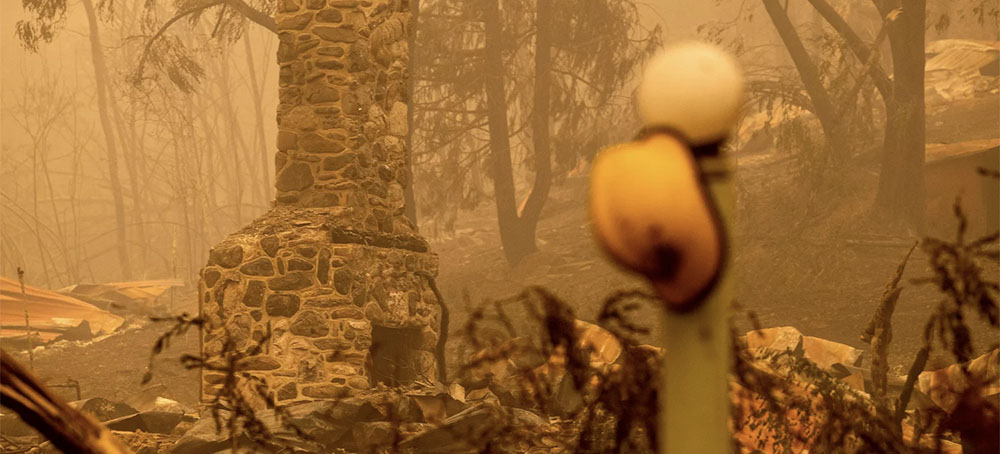 A chimney stands at a destroyed building as the McKinney Fire burns in Klamath National Forest, Calif., on Sunday. (photo: Noah Berger/AP)
A chimney stands at a destroyed building as the McKinney Fire burns in Klamath National Forest, Calif., on Sunday. (photo: Noah Berger/AP)
The McKinney Fire was burning out of control in Northern California's Klamath National Forest, with expected thunderstorms a big concern Sunday just south of the Oregon state line, said U.S. Forest Service spokesperson Adrienne Freeman.
"The fuel beds are so dry and they can just erupt from that lightning," Freeman said. "These thunder cells come with gusty erratic winds that can blow fire in every direction."
The blaze exploded in size to more than 80 square miles (207 square km) just two days after erupting in a largely unpopulated area of Siskiyou County, according to a Sunday incident report. The cause was under investigation.
The blaze torched trees along California Highway 96, and the scorched remains of a pickup truck that sat in a lane of the highway. Thick smoke covered the area and flames burned through hillsides in sight of homes. The fire Sunday cast an eerie, orange-brown hue in one neighborhood where a brick chimney stood surrounded by rubble and scorched vehicles.
A second, smaller fire just to the west that was sparked by dry lightning Saturday threatened the tiny town of Seiad, Freeman said. About 400 structures were under threat from the two California fires. Authorities have not confirmed the extent of the damage yet, saying assessments would begin when it was safe to reach the area.
A third fire, which was on the southwest end of the McKinney blaze, prompted evacuation orders for around 500 homes Sunday, said Courtney Kreider, a spokesperson with the Siskiyou County Sheriff's Office. The office said crews had been on the scene of the fire since late Saturday but that the fire Sunday morning "became active and escaped its containment line."
Several people in the sheriff's office have been affected by evacuation orders due to the fires "and they're still showing up to work so, (a) very dedicated crew," she said. A deputy lost his childhood home to fire on Friday, she said.
The McKinney fire "remains 0% contained," the Siskiyou County Sheriff's Office said in a Facebook post late Sunday night.
As the McKinney fire threatened, some residents chose to stay behind while others heeded orders to leave.
Larry Castle and his wife, Nancy, were among about 2,000 residents of the Yreka area under evacuation orders. They left Saturday with some of their prized possessions, including Larry's motorcycle, and took their dogs to stay with their daughter near Mount Shasta.
Larry Castle said he wasn't taking any chances after seeing the explosive growth of major fires in recent years.
"You look back at the Paradise fire and the Santa Rosa fire and you realize this stuff is very, very serious," he told the Sacramento Bee.
In northwest Montana, a fire sparked in grasslands near the town of Elmo had grown to about 17 square miles (44 square km) after advancing into forest. Crews were working along edges of the fire Sunday, and aircraft were expected to continue to make water and retardant drops to help slow the fire's advance, said Sara Rouse, a spokesperson with the interagency team assigned to the fire. High temperatures and erratic winds were expected, she said.
A section of Highway 28 between Hot Springs and Elmo that had been closed was reopened with drivers asked to watch for fire and emergency personnel. Visibility in the area was poor, Rouse said.
In Idaho, the Moose Fire in the Salmon-Challis National Forest has burned on more than 75 square miles (196 square km) in timbered land near the town of Salmon. It was 21% contained by Sunday morning. Pila Malolo, planning operations section chief on the fire, said in a Facebook video update that hot, dry conditions were expected to persist Sunday. Officials said they expected fire growth in steep, rugged country on the fire's south side.
California Gov. Gavin Newsom declared a state of emergency Saturday as the McKinney Fire intensified. The proclamation allows Newsom more flexibility to make emergency response and recovery effort decisions and access federal aid.
California law enforcement knocked on doors in the towns of Yreka and Fort Jones to urge residents to get out and safely evacuate their livestock onto trailers. Automated calls were being sent to land phone lines as well because there were areas without cell phone service.
Scientists say climate change has made the West warmer and drier in the past 30 years and will continue to make weather more extreme and wildfires more frequent and destructive.
The Pacific Coast Trail Association urged hikers to get to the nearest town while the U.S. Forest Service closed a 110-mile (177-km) section of the trail from the Etna Summit to the Mt. Ashland Campground in southern Oregon.
In Hawaii, the Maui County Emergency Management Agency said a brush fire was 90% contained but a red flag warning was in effect for much of Sunday.
And in north Texas, firefighters continued in their effort to contain the 2-week-old, 10 1/2-square-mile (27 1/3-square-kilometer) Chalk Mountain Fire. The crews now report 83% containment of the fire that has destroyed 16 homes and damaged five others about 50 miles (80 kilometers) southwest of Fort Worth. No injuries have been reported.
Follow us on facebook and twitter!
PO Box 2043 / Citrus Heights, CA 95611



No comments:
Post a Comment
Note: Only a member of this blog may post a comment.